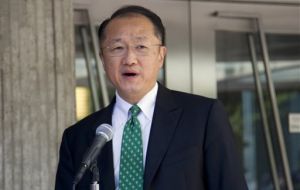MercoPress. South Atlantic News Agency
World Bank warns that Euro debt crisis will have an impact on most regions
 Jim Yong Kim: what happens in Europe affects the fisherman in Senegal and the software programmer in India
Jim Yong Kim: what happens in Europe affects the fisherman in Senegal and the software programmer in India World Bank President Jim Yong Kim on Wednesday warned that most regions of the world will be hurt by the debt crisis enveloping the Euro zone and said it was vital to protect the strong economic gains of the past decade in the developing world.
In his first public speech since taking the helm of the World Bank on July 1, Kim said even if the Euro zone crisis is contained, it could still reduce growth in most of the world's regions by as much as 1.5 percentage points.
A major crisis in Europe could slash GDP in developing countries by 4 percentage points or more, enough to trigger a deep global recession, he said.
“Such events threaten many of the recent achievements in the fight against poverty,” he said, noting that over the last decade nearly 30 developing countries have grown by 6% or more annually.
Outlining challenges for the global poverty-fighting institution, Kim said his priority was to protect development gains from economic risks, such as the Euro zone crisis, which has begun to weigh on growth in large emerging economies like China.
For now, the world's poorest nations appear to be somewhat insulated from the Euro zone crisis because they have limited exposure to global financial markets.
But Kim said not everyone would be spared and he urged European policymakers to take necessary steps to restore stability.
“To put it starkly, what's happening in Europe today affects the fisherman in Senegal and the software programmer in India,” Kim told the Brookings Institution, a think tank in Washington.
He said the bank had a role in broadening development to include fragile states or countries afflicted by conflict so they are not left trailing behind, and ensuring growth in developing regions is lasting and benefits everyone.
“Even as an unprecedented number of people in the developing world are ascending into the middle class, segments of the poorest populations are being left behind, and other segments of the middle class are at risk of falling back into poverty,” he said.
Unlike previous heads of the World Bank, Kim is a physician and anthropologist, not a politician, banker or a career diplomat. His work has focused on bringing healthcare to the poor, whether fighting tuberculosis in Haiti and Peru or tackling HIV/AIDS in Russian prisons.
As he makes his rounds of the different parts of the World Bank Group, Kim said he was focused on what he called “the science of delivering results,” in which the impact of development projects on people can be measured.
“We have to have focus on actually delivering results on the ground,” Kim said. Such ideas are likely to play well among the World Bank's major donors, such as the United States, which are facing budget constraints and wanting to see tax dollars put to good use.




Top Comments
Disclaimer & comment rulesCommenting for this story is now closed.
If you have a Facebook account, become a fan and comment on our Facebook Page!